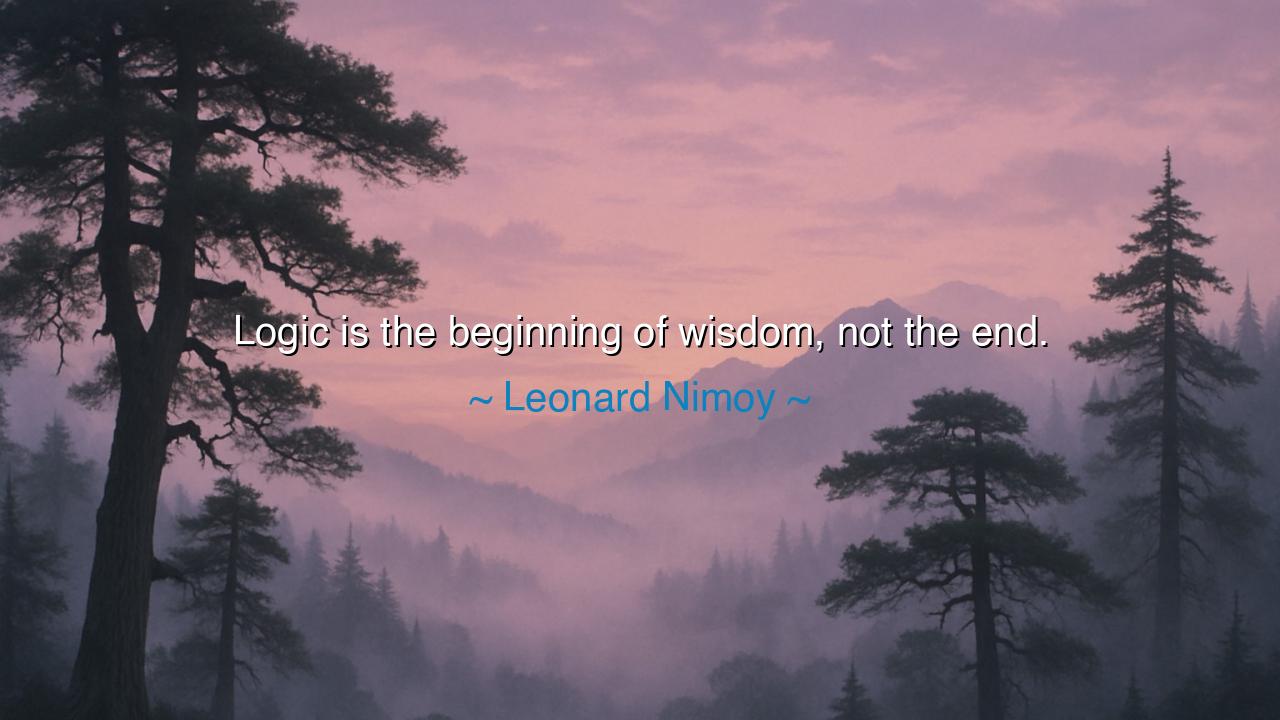
Logic is the beginning of wisdom, not the end.






Leonard Nimoy, speaking through the timeless mask of Spock, gave us this paradox of the spirit: “Logic is the beginning of wisdom, not the end.” In this teaching he reminds us that logic, though noble and necessary, is only the first step upon the road to wisdom. Reason alone may sharpen the mind, but without compassion, imagination, and humility, it cannot crown the soul. To stop at logic is to mistake the doorway for the temple.
Logic is the compass that steadies the traveler, protecting him from folly and illusion. It brings order to chaos, clarity to confusion, and discipline to thought. Yet, as Nimoy suggests, true wisdom lies beyond—where reason is married to love, and clarity is tempered by mercy. One who clings only to logic may know how to win an argument, but not how to heal a wound; how to build a machine, but not how to guide a heart. Thus logic must lead into deeper waters, where wisdom dwells.
History offers proof. Consider the Stoics of ancient Rome, who prized reason as a divine gift. They sought to govern life with discipline and order, and in this they laid the foundation for endurance and strength. Yet even they admitted that reason must be joined with virtue and with love for mankind. Marcus Aurelius, philosopher-emperor, wrote not only of logic, but of patience, compassion, and justice. His greatness lay not in cold calculation, but in wisdom born of reason guided by the heart.
So too, in the realm of science, Albert Einstein once declared, “Imagination is more important than knowledge.” He, a master of logic, understood that reason without wonder cannot unlock the mysteries of the universe. Logic opened the gate, but it was imagination and humility that carried him further. Nimoy’s words echo the same truth: do not mistake the tool for the treasure, nor the first step for the journey’s end.
O children of tomorrow, let this be your guide: embrace logic as your foundation, but do not worship it as your god. Build upon it the higher pillars of kindness, vision, and humility, and you shall approach true wisdom. For logic clears the path, but wisdom walks it; logic lights the torch, but wisdom carries it into the night. Nimoy’s voice, though spoken in the guise of fiction, resounds as ancient truth: logic is the beginning of wisdom, not the end.






GDGold D.dragon
I feel both reflective and curious after reading this. It suggests that logic is a tool, not a destination, which challenges the common view that rationality alone defines intelligence. How do intuition, experience, and moral judgment interact with logic to create wisdom? I also wonder whether societies that overemphasize rationality risk undervaluing creativity, compassion, or cultural understanding. Could this perspective encourage a more balanced approach to personal growth and leadership?
PDPhong Dinh
This quote raises questions about the relationship between intellect and understanding. Does relying on pure logic risk creating clever but impractical or morally blind conclusions? I’m intrigued by the notion that wisdom encompasses not just correct thinking, but also discernment, ethical awareness, and emotional intelligence. Could acknowledging the limitations of logic help prevent overconfidence in decision-making and foster a more holistic approach to problem-solving?
HGBao Vu Hoang Gia
I find this statement both provocative and liberating. It implies that wisdom is dynamic and evolving, rather than a fixed endpoint achievable through reasoning alone. Could it be that logic sets the stage for exploration, but true wisdom emerges from lived experience, reflection, and adaptability? I also wonder whether this distinction can inform education, suggesting that nurturing critical thinking should be complemented by lessons in empathy and practical judgment.
BMtran binh minh
Reading this, I feel challenged by the idea that logic is not the final destination. Does this suggest that wisdom involves integrating knowledge from multiple sources, including intuition, creativity, and ethical reflection? I’m curious whether this means that people who excel at analysis are not necessarily wise, and that wisdom requires a broader perspective. How can one cultivate wisdom beyond the structured reasoning that logic provides?
THTrang Hoang
This quote makes me think about the limits of reasoning alone. Is it possible that logic can only guide us to questions or frameworks, but not to true understanding or insight? I wonder whether wisdom requires experience, empathy, and intuition alongside rational thinking. Could it be that relying solely on logic risks missing the subtleties of human behavior, emotion, and morality that are essential to making truly wise decisions?